Speaking of industrial flooring, the first thing to considering is the hardness, chemical resistance, abrasion resistance, as well as its load bearing capacity. Different types of flooring have seperate properties and resistances, therefore understanding the each type and its function play an important in the selection of company as well as constructor in order to bring the most suitable choice for customers.
This artical will provide the basic description of each type and which environment they are most appropriate for.
The definition of industrial flooring
Industrial flooring is a seamless floor used in industrial manufacture activities that are abrasion resistance, strong impact resistance,chemical resistance, slip resistance… The ordinary concrete floor only provide a basic grey , however to meet internation standards in manufacturing activites, food and beverage or phamaceutical , industrial floor are now available in different type of coating to support those requirements, also these coating is offer the the wide range of color to create the aesthetic look for the floor.
Different types of industrial flooring
There are several types of industrial flooring, at Infloor we provide the best flooring solution that are high performance, sustainable, easy to maintain. Infloor service will bring the most suitable floor for any kind of constructions as warehouse, commercial space, medical center based on the extension effects and colors of floor.
1. The polish concrete flooring
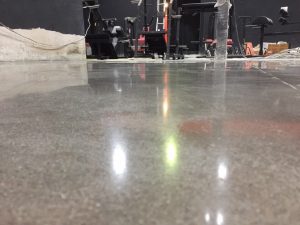
This method is increasing the hardness of the existing concrete to decrease the damage by other physical activities that damage the floor surface. The process of this method including : grinding the existing concrete surface ( it is possible to grind to the stone layer to create more attractive surface ), then using chemical to hardener the stone and finally is to polish the surface.
This flooring is one of the most popular flooring type due to its affordable pricing, quick- application, but still require the basic standards of industrial flooring like : hardness, easy cleaning, long-time service… However, with this flooring the aesthetic aspect is not achieve, uneven color, not cover the available defects, besides cracks are easily appear in this type of flooring so it is not suitable for the watering area.
The polish concrete flooring are low pricing and suitable most for factories as schools, commercial center…
2. Epoxy flooring
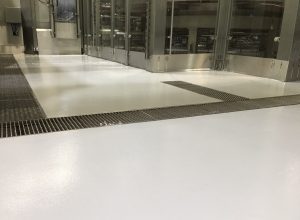
2.1 Epoxy roller fooring system
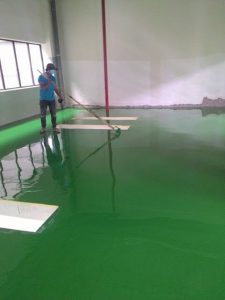
This type of flooring is requires both performance and aesthetics concern and low pricing aspects for the factories. With this method, the time of application should be including grinding to smooth the surface,produce roughness and remove concrete dust, applying the primer, and last one is to coating the 2 layers of epoxy. Each layer requires 8 hours waiting time.
The advantages of epoxy flooring is low cost, meet those requirements as chemical resistance, besides it provides a wide range of color and are high coverage. However, this type has a short life service, easy to be damaged, and only stand the light traffic loading.
The roller epoxy flooring system is suitable for those are light weight loading such as garment and textile factories, schools, hospitals…
2.2 Self-leveling epoxy system
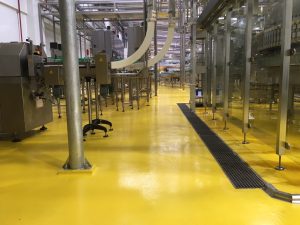
This is a more advanced flooring system than the epoxy roller system, the process of this method is similar to epoxy roller system, but the self-leveling epoxy flooring will be thicker. The advantages of this type of flooring is thicker, easy to clean. However this type of flooring has yet not overcome the disadvantage is hard to maintain. This system is recommended to use in medium load area.
2.3 Mortar system epoxy flooring
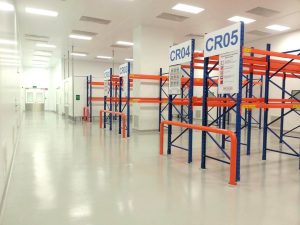
This type of flooring has a Epoxy mortar layer between the primer and the coating to increase the hardness and grib for the floor. The process of this type of flooring has 4 steps : first is to treat the concrete layer to create the roughness for the floor and remove the damage are, and then apply the primer at the same time as the mortar layer, press the surfaces with a machine, finally is to coating the epoxy layer.
This method meets all the requirements such as abrasion resistance, chemical resistance, high grib, and long time use. The disadvantages of this system is long time application and the high price.
This type is usually use in manufacturing industry, warehouses with high activities intesity, heavy loads .
3. PU flooring
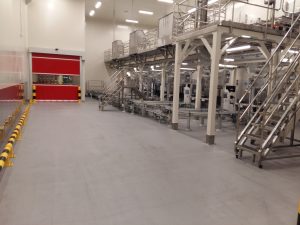
PU flooring is the type of flooring commonly used in food industry, cold storage flooring based on it the thermal shock resistance of PU.
2.1 Self-leveling PU flooring
The process is similar to self-leveling epoxy floor, but PU floor will have better heat resistance than epoxy floor. PU floor has all the characteristics of epoxy floor such as hardness, chemical resistance, easy to clean, but PU floor will have a matte ,non-glossed surface .
2.2. Mortar system PU flooring
Similar to the epoxy grout floor, the mortar PU floor also has 4 steps: treating the concrete layer, the primer at the same time as the mortar layer, and the top layer of chemical resistant painting.
Post A Comment